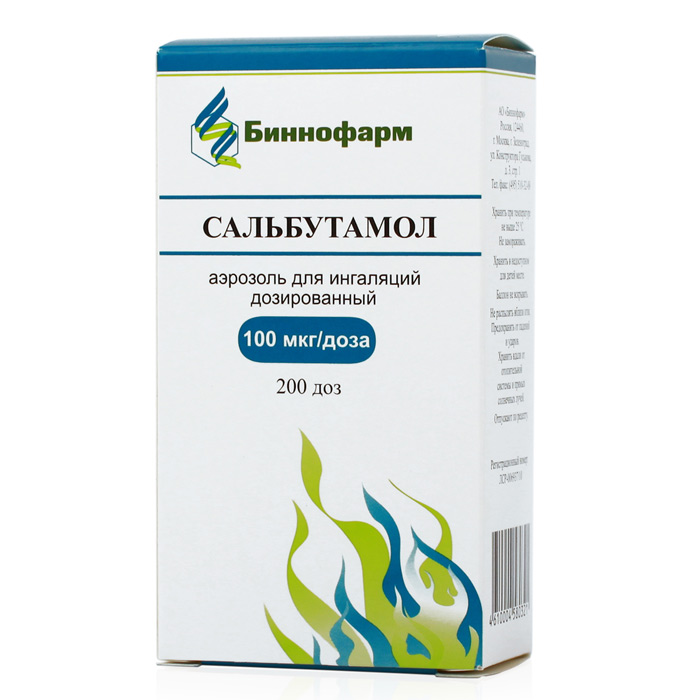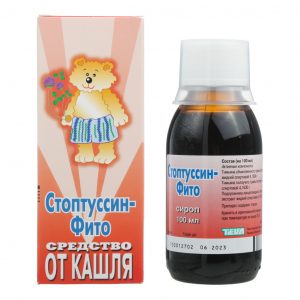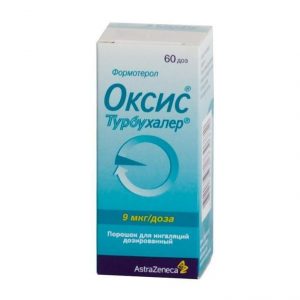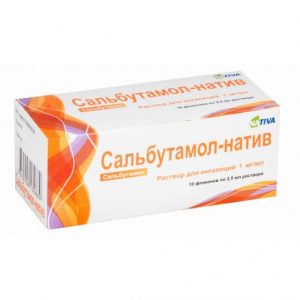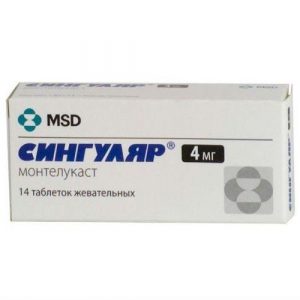Description
Release form
Metered-dose aerosol for inhalation.
Packing
Bottle 12 ml (200 doses).
Pharmacological action of
Salbutamol is a selective 2-adrenergic receptor agonist. In therapeutic doses, it acts on 2-adrenergic receptors of the smooth muscles of the bronchi, having a negligible effect on 1-myocardial receptors. It has a pronounced bronchodilating effect, preventing or stopping bronchospasm, reduces resistance in the airways. Increases lung capacity.
At the recommended therapeutic doses, it does not adversely affect the cardiovascular system and does not cause an increase in blood pressure.
To a lesser extent, in comparison with the drugs of this group, has a positive chrono- and inotropic effect. It causes the expansion of the coronary arteries.
Has a number of metabolic effects: reduces the concentration of potassium in the plasma, affects glycogenolysis and insulin secretion, has a hyperglycemic (especially in patients with bronchial asthma) and lipolytic effect, increasing the risk of acidosis.
After application of inhalation forms, the action develops rapidly, the onset of the effect – after 5 minutes, maximum – after 30-90 minutes (75% of the maximum effect is achieved within 5 minutes), duration – 4-6 hours.
Indications
1. Bronchial asthma:
relief of attacks of bronchial asthma, including with exacerbation of severe bronchial asthma
prevention of bronchospasm attacks associated with exposure to an allergen or physical exertion
use as one of the components for long-term maintenance treatment of bronchial asthma.
2. Chronic obstructive pulmonary disease (COPD), accompanied by reversible airway obstruction, chronic bronchitis.
Contraindications
Hypersensitivity to any component of the drug.
Children’s age up to 2 years.
Caution:
If there is a history of tachyarrhythmias, myocarditis, heart defects, aortic stenosis, coronary heart disease, severe chronic heart failure, hypertension, thyrotoxicosis, pheochromocytoma, decompensated diabetes mellitus, glaucoma, or liver disease,
With the simultaneous administration of non-selective 2-blockers, pregnancy, during lactation.
Use during pregnancy and lactation
Pregnant women can be prescribed salbutamol only when the expected benefit to the patient outweighs the potential risk to the fetus.
The likelihood of penetration of salbutamol into breast milk is not excluded, therefore, it is not recommended to appoint it to lactating women, unless when the expected benefit for the patient exceeds the potential risk to the child.
There is no data on whether salbutamol present in breast milk has a harmful effect on the newborn.
Special instructions
Patients should be instructed on the proper use of salbutamol. The correct use of the drug and the strict implementation of the instructions are necessary in order to ensure that salbutamol enters the bronchi. At the beginning of treatment, the drug should be used under the supervision of medical personnel and after training in front of a mirror.
As with other inhaled drugs, therapeutic effect may decrease with cooling of the balloon. Therefore, before use, the bottle with the drug should be warmed to room temperature (warm the bottle with your hands for several minutes, you can not use other methods!).
The contents of the cylinders are under pressure, so the cylinders must not be heated, crushed, pierced or burned, even when they are empty.
In case of discomfort in the mouth and sore throat after inhalation, rinse your mouth with water.
Bronchodilators should not be the only or main component of therapy for unstable or severe bronchial asthma.
If the effect of the usual dose of the drug becomes less effective or shorter (the effect of the drug should last at least 3 hours), the patient should consult a doctor. An increase in the dose or frequency of taking salbutamol should be carried out only under the supervision of a doctor. Reducing the interval between taking the following doses is possible only in exceptional cases and should be strictly justified. The increased need for the use of inhaled agonists of 2-adrenergic receptors with a short duration of action for the treatment of bronchial asthma indicates an exacerbation of the disease. In such cases, the patient’s treatment plan should be reviewed. Taking high doses of salbutamol during exacerbation of bronchial asthma can cause ricochet syndrome (every next attack becomes more intense). With a severe attack of suffocation, the interval between inhalations should be at least 20 minutes.
The risk of complications increases with a significant duration of treatment, and with a sharp discontinuation of the drug. Long-term use of salbutamol should be accompanied by the use of anti-inflammatory drugs for basic therapy.
A sudden and progressive worsening of bronchial asthma can be a threat to the patient ² ¢s life, so in such cases it is urgent to decide on the appointment or increase in the dose of glucocorticosteroids. In such patients, it is recommended to monitor peak expiratory flow daily.
Salbutamol should be used with caution in patients with thyrotoxicosis.
Therapy with 2-adrenoreceptor agonists, especially when administered parenterally or when used with a nebulizer, can lead to hypokalemia. Particular caution is recommended in the treatment of severe attacks of bronchial asthma, since in these cases hypokalemia can be enhanced as a result of the simultaneous use of xanthine derivatives, glucocorticosteroids, diuretics, as well as due to hypoxia. In such cases, it is necessary to control the level of potassium in the blood serum.
Composition
1 dose of the preparation contains:
Active ingredient:
salbutamol sulfate (in terms of 100% substance) 0.1208 mg (equivalent to 0.1 mg salbutamol).
Excipients:
oleyl alcohol 0.0625 mg,
ethanol (rectified ethyl alcohol) 2.02 mg,
propellant R 134a (1,1,1,2-tetrafluoroethane, HFA 134a) 56.91 mg.
The product does not contain chlorofluorocarbon propellants.
1 bottle of the preparation contains:
Active ingredient:
salbutamol sulfate (in terms of 100% substance) 0, 029 g (equivalent to 0.024 g of salbutamol).
Excipients:
oleyl alcohol 0.015 g,
ethanol (rectified ethyl alcohol) 0.485 g,
propellant R 134a (1,1,1,2-tetrafluoroethane, HFA 134a) 13,659 g (up to 12,00 ml).
The product does not contain chlorofluorocarbon propellants.
Dosing and Administration
Salbutamol Inhalation Aerosol Dosage 100 μg / dose is intended for inhalation administration only.
Only a doctor can resolve the issue of increasing the dose or frequency of use of the drug.
It is not recommended to use the drug more than 4 times a day. The need for frequent use of maximum doses of the drug or in a sudden increase in dose indicates a worsening of the course of the disease.
It is not recommended to use the drug more than 4 times a day. The need for frequent use of maximum doses of the drug or in a sudden increase in dose indicates a worsening of the course of the disease.
Relief of an attack of bronchospasm: the recommended dose is 100-200 mcg (1-2 inhalations).
Prevention of bronchospasm attacks associated with exposure to an allergen or caused by physical exertion: the recommended dose is 200 mcg (2 inhalations) 10-15 minutes before exposure to a provoking factor.
Children. Long-term maintenance therapy for asthma and COPD as part of complex therapy: the recommended dose is up to 200 mcg (2 inhalations) 4 times a day.
Relief of an attack of bronchospasm: the recommended dose is 100-200 mcg (1-2 inhalations).
Prevention of bronchospasm attacks associated with exposure to an allergen or caused by physical exertion: the recommended dose is 100-200 mcg (1-2 inhalations) 10-15 minutes before exposure to a provoking factor.
Preparation for first use:
Before the first use of the drug, remove the protective cap from the inhaler nozzle. Then shake the bottle vigorously with vertical movements, turn the bottle upside down with the inhaler nozzle and make two sprays into the air to make sure that the valve works properly. If you interrupt the use of the drug for several days, you should do one spray in the air after thoroughly shaking the balloon.
Side effects
The frequency of side effects can be divided into the following categories: very often (1/10), often (1/100 and <1/10), infrequently (1/1000 and <1/100), rarely ( 1/10 000 and <1/100), very rare (<1/10 000) occurring. On the part of the immune system: rarely – dermatitis, very rarely – hypersensitivity reactions, including angioedema, skin rash. On the part of metabolic processes: rarely – hypokalemia. From the nervous system: often – tremor, headache, anxiety rarely – dizziness, drowsiness, fatigue is very rare – hyperactivity. From the cardiovascular system: often – tachycardia, palpitations rarely – expansion of peripheral vessels with skin hyperemia, discomfort or chest pain is very rare – arrhythmia, including atrial fibrillation, supraventricular tachycardia, extrasystole, decreased blood pressure and collapse. From the respiratory system: rarely – cough, respiratory tract irritation very rarely – bronchospasm (paradoxical or caused by hypersensitivity to the drug). From the gastrointestinal tract: rarely – dryness and irritation of the mucous membrane of the oral cavity and pharynx, change in taste, nausea, vomiting. From the musculoskeletal system: rarely – muscle cramps. Drug Interactions It is not recommended to use salbutamol and non-selective 2-adrenoreceptor blockers, such as propranolol, at the same time. Salbutamol is not contraindicated in patients who receive monoamine oxidase inhibitors (MAOIs). Enhances the action of central nervous system stimulants. Theophylline and other xanthines with simultaneous use increase the likelihood of developing tachyarrhythmias for inhalation anesthesia, levodopa – severe ventricular arrhythmias. Concomitant use with m-anticholinergics (including inhalation) can contribute to increased intraocular pressure. Diuretics and glucocorticosteroids enhance the hypokalemic effect of salbutamol. Overdose Symptoms: More common – hypokalemia, lowering blood pressure, tachycardia, muscle tremor, nausea, vomiting less frequent – excitation, hyperglycemia, respiratory alkalosis, respiratory alkalosis, respiratory alkalosis, peripheral vessels. Treatment: Cardioselective 2-blockers are the best antidote for salbutamol overdose. However, blockers of 2-adrenoreceptors should be used with caution (risk of developing bronchospasm). Using large doses of salbutamol can cause hypokalemia, so you should monitor your serum potassium for suspected overdose. Storage conditions Do not store above 25 ° C. Do not freeze. Keep out of the reach and sight of children. Keep away from the heating system and direct sunlight. Protect against falls and shocks. Shelf life 3 years. Do not use after the expiration date indicated on the package. Deystvuyushtee substance Salybutamol Prescription dosage form aerosol for inhalation Possible product names SALBUTAMOL 100MKG / DOSE 200DOSE 12ML AEROSOL SALBUTAMOL 100MKG / DOSE AEROSOL DOLI / INZA. 200DOSE (12ML) M (R) Salbutamol aer d / inhal dosing 100mkg / dose 200 doses 12ml point al ind unitary Salbutamol aer. fl. 100mkg / dose 200doses 12ml Russia Salbutamol aer12ml 200d. Binno ARM, Russia
